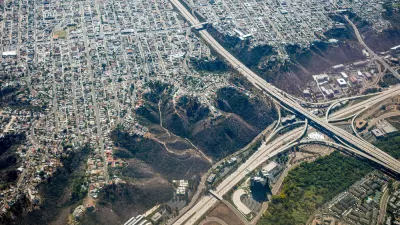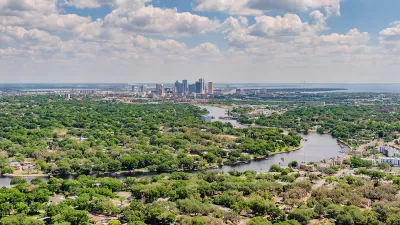A melting economy and struggling suburbs may mean it's time to reconsider how we model our cities and development patterns, according to this column.
"For a half-century we've watched the suburban sprawl machine ooze its ticky tacky across northeastern Illinois with little regard for aesthetics, for the rising cost of energy or, for that matter, the cost of leaving the region's have-nots behind in older, have-not communities."
"We convinced ourselves that nothing could be done about this process because, after all, it's a free country. It's what people want. And the business model-buying up land by the quarter section and selling it by the square foot-was surefire. Everybody made money-the farmers who sold, the developers who bought and built, the mortgage and real estate brokers."
"But wait. Now that the sprawl machine has slowed to a dead stop; now that its life's blood of easy mortgage money flows no more; and now that our trust in the unfailing wisdom of "free men and free markets" has cost us half of our retirement savings, maybe, just maybe, it's time to revisit the inevitability of suburban sprawl."
"But as the housing industry grinds to a halt, and as the "masters of the universe" on Wall Street are revealed to be no smarter than you or I, there is a growing sense that tomorrow's economy need not be modeled on the one that just failed us."
"If the federal government can use our tax dollars to bolster private banks, why can't states, counties and towns require private developers to include some energy efficiency, transit access, walkways and just plain common sense?"
FULL STORY: A brave new (sprawl-free) world

Planetizen Federal Action Tracker
A weekly monitor of how Trump’s orders and actions are impacting planners and planning in America.

Congressman Proposes Bill to Rename DC Metro “Trump Train”
The Make Autorail Great Again Act would withhold federal funding to the system until the Washington Metropolitan Area Transit Authority (WMATA), rebrands as the Washington Metropolitan Authority for Greater Access (WMAGA).

The Simple Legislative Tool Transforming Vacant Downtowns
In California, Michigan and Georgia, an easy win is bringing dollars — and delight — back to city centers.

The States Losing Rural Delivery Rooms at an Alarming Pace
In some states, as few as 9% of rural hospitals still deliver babies. As a result, rising pre-term births, no adequate pre-term care and "harrowing" close calls are a growing reality.

The Small South Asian Republic Going all in on EVs
Thanks to one simple policy change less than five years ago, 65% of new cars in this Himalayan country are now electric.

DC Backpedals on Bike Lane Protection, Swaps Barriers for Paint
Citing aesthetic concerns, the city is removing the concrete barriers and flexposts that once separated Arizona Avenue cyclists from motor vehicles.
Urban Design for Planners 1: Software Tools
This six-course series explores essential urban design concepts using open source software and equips planners with the tools they need to participate fully in the urban design process.
Planning for Universal Design
Learn the tools for implementing Universal Design in planning regulations.
Smith Gee Studio
City of Charlotte
City of Camden Redevelopment Agency
City of Astoria
Transportation Research & Education Center (TREC) at Portland State University
US High Speed Rail Association
City of Camden Redevelopment Agency
Municipality of Princeton (NJ)





























